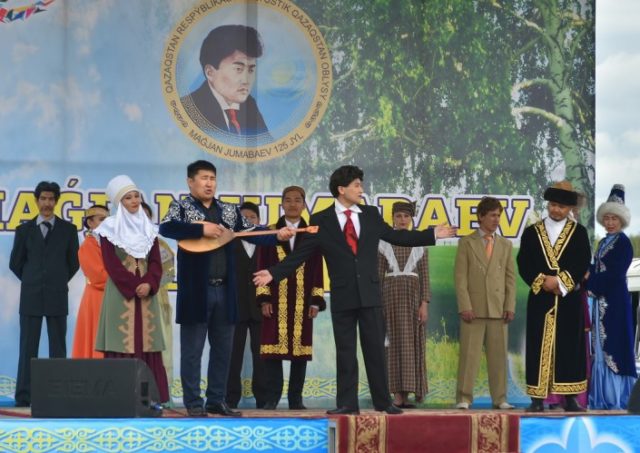
Revival of Pan-Turkism in Kazakhstan Threatens Pillars of Eurasian Union
Publication: Eurasia Daily Monitor Volume: 15 Issue: 104
By:

The term “pan-Turkism,” which carried a similarly ominous meaning as “enemy of the people” under Joseph Stalin and his Soviet successors, has become a strong component of Kazakhs’ search for national identity ever since their country achieved independence more than a quarter of a century ago. Indeed, modern Kazakhs have developed a strong sense of pride of belonging to the Turkic World. All this came to the foreground recently, during celebrations of the 125th anniversary of the birth of national poet Magzhan Zhumabayev, who was exiled to Siberia during the Stalinist purges and shot, in 1937, at an NKVD prison for glorifying pan-Turkism and nationalism. Not only did Soviet authorities remove Magzhan’s poems from books, they also banned his name (Inform.kz, April 30).
The open-air cultural event, staged on June 22, near the village of Sarytomar, North Kazakhstan, the birthplace of Zhumabayev, was attended by prominent intellectuals and public figures from Turkey, Azerbaijan, Uzbekistan, Kyrgyzstan as well as representatives of Turkic-speaking minorities of the Russian Federation and Mongolia. The akim (governor) of North Kazakhstan region, Kumar Aksakalov, stressing that Zhumabayev was the poet of all Turkic nations, read out a congratulatory letter from Kazakhstani President Nursultan Nazarbayev. Additionally, the chairperson of the International Organization of Turkic Culture (TURKSOY), Duysen Kasseinov, noted that 2018 was declared the year of Magzhan Zhumabayev in all Turkic-language-speaking countries (Tengrinews.kz, June 24).
Earlier, on June 19, President Nazarbayev signed a decree to transfer the regional capital of South Kazakhstan from Shymkent to Turkestan and create a new territorial entity—Turkestan region. The holy city of Turkestan is widely recognized as “the spiritual capital of the Turkic world.” Nazarbayev emphasized the “historical significance” of this decision (Inform.kz, June 19).
Kazakhstan’s government, with its historically strong ties to Slavic states and particularly to Russia, has never officially displayed its pan-Turkic leanings particularly pointedly. But Nazarbayev’s increasingly ambiguous attitude toward the Russia-dominated Eurasian Economic Union (EEU) suggests that, at least in economic terms, he is seeking more independence from Moscow and closer ties with Istanbul. At the 2013 session of the Supreme Eurasian Economic Council, in Minsk, he actually proposed admitting Turkey into the Customs Union of (at the time) Russia, Belarus and Kazakhstan and dissolving the Eurasian Union as a redundant and inefficient structure. Nazarbayev expressed a worry that “we are recreating the USSR [Union of Soviet Socialist Republics] or something subordinated to Russia” (Nur.kz, October 24, 2013).
This was not the first time the Kazakhstani president irritated Moscow with such rhetoric. A year earlier, in Ankara, Nazarbayev addressed a session of the Turkic Council and emphatically reiterated the words of Mustafa Kemal Atatürk, the founder of the Republic of Turkey, who said, “The time will come when all Turkic people will unite.” Nazarbayev himself added, “If we unite we can become a very efficient force in the world.” Russia was not prepared to hear such words from someone considered to be the staunchest supporter of Eurasian (that is, Moscow-driven) economic integration (Stoletie.ru, November 6, 2012).
But despite pan-Turkic feelings shared by intellectuals in both Kazakhstan and Turkey, inter-governmental relations between Istanbul and Astana have not always been smooth. In some sense, for Kazakhstan, the events following the 2016 military coup attempt in Turkey proved to be a litmus test of attachment to its principles of political independence and sovereignty from its “big brother” Turkey. Kazakhstani authorities have not yielded to repeated demands by Ankara to close Turkish educational institutions and stop the domestic activities of all organizations suspected of being linked to Fethullah Gülen. The exiled cleric Gülen has for years been an uncompromising opponent of Turkish President Recep Tayyip Erdoğan, and Ankara accuses him and his organization of having masterminded and carried out the aborted coup two years ago. Nevertheless, the Ministry of Education of Kazakhstan ignored these calls, arguing that Turkish schools opened in Kazakhstan based on a bilateral agreement signed by Nursultan Nazarbayev and the former president of Turkey, Turgut Özal; moreover, Astana asserted, these schools are being financed by Kazakhstan (Informburo.kz, July 29, 2016).
Such tensions with Turkey notwithstanding, Russia’s 2014 annexation of Crimea and the frequent imperialistic rhetoric coming from Moscow have been fueling a Russophobic mood among Kazakh nationalists and thus providing fertile soil for budding pan-Turkism inside Kazakhstan. Recently, Russian TV journalist Vladimir Solovyov, notorious for his inflammatory language, accused Kazakhstan of assisting the United States in creating a naval base in the Caspian (see EDM, April 26). Solovyov’s comment drew an immediate reaction from Kazakh nationalists, who demanded the withdrawal of Russian military personnel currently stationed in eight regions of Kazakhstan (Abai.kz, July 10).
Despite overwhelming fears in Moscow, the rise of Pan-Turkism in Kazakhstan and in Central Asia is not likely to pose an immediate threat to Russia in the foreseeable future. Turkish influence over the Turkic nations of the region, at this stage, is limited to cultural and economic arears. But either way, the spread of pan-Turkism presents a serious long-term challenge to the Kremlin’s concept of Eurasian unity.



